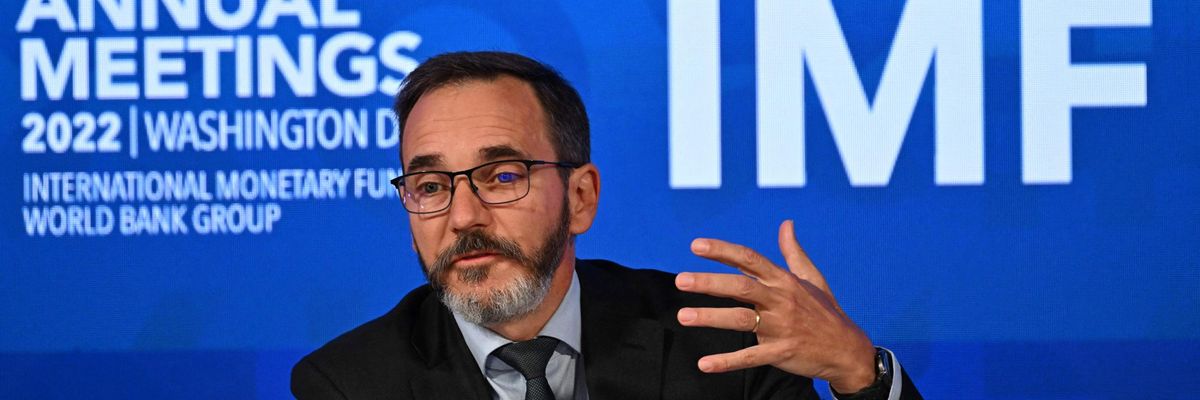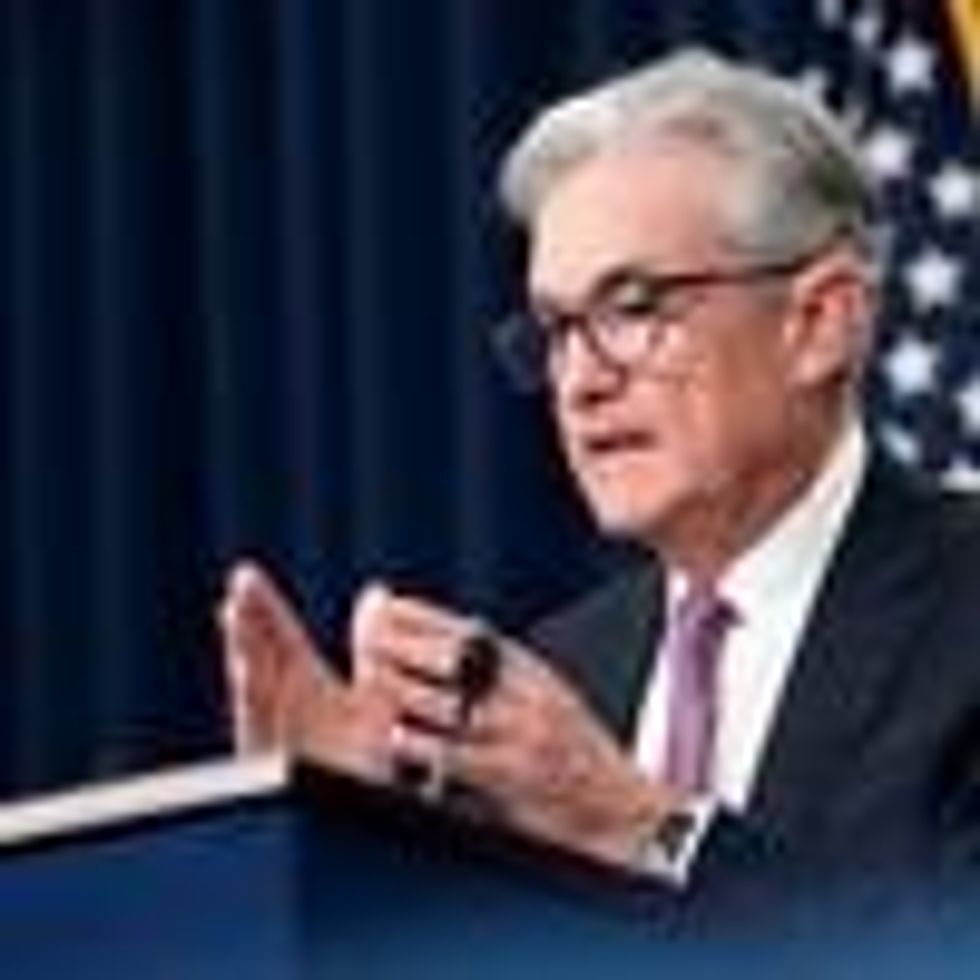

SUBSCRIBE TO OUR FREE NEWSLETTER
Daily news & progressive opinion—funded by the people, not the corporations—delivered straight to your inbox.
5
#000000
#FFFFFF
To donate by check, phone, or other method, see our More Ways to Give page.


Daily news & progressive opinion—funded by the people, not the corporations—delivered straight to your inbox.

International Monetary Fund chief economist Pierre-Olivier Gourinchas speaks at a press conference on October 11, 2022. (Photo: Jim Watson/AFP via Getty Images)
The International Monetary Fund on Tuesday became the latest prominent global institution to warn that the world economy is barreling toward a potentially devastating recession as central banks aggressively raise interest rates, Russia's war in Ukraine rages, and pandemic-induced supply chain disruptions persist.
In its new World Economic Outlook report, the IMF lowered its global growth forecast for next year in the face of myriad "steep challenges" and warned that "the worst is yet to come" for many countries as a strong U.S. dollar worsens debt burdens and costs-of-living crises in developing nations.
"Monetary policy could miscalculate the right stance to reduce inflation."
"Risks to the outlook remain unusually large and to the downside," the report states. "Monetary policy could miscalculate the right stance to reduce inflation... More energy and food price shocks might cause inflation to persist for longer. Global tightening in financing conditions could trigger widespread emerging market debt distress."
The IMF expects inflation, which is afflicting countries across the globe, to remain elevated through next year even as the U.S. Federal Reserve and other powerful central banks attempt to tamp down demand, risking mass job loss and a worldwide economic crisis.
Pierre-Olivier Gourinchas, the IMF's director of research, cautioned in a blog post Tuesday that central banks could hurl the global economy into an "unnecessarily severe recession" if they go too far with interest rate increases, echoing a concern voiced in recent weeks by the World Bank, the United Nations, and progressive economists.
"Financial markets may also struggle with overly rapid tightening," Gourinchas added.
In an interview with The New York Times, Gourinchas said the IMF expects "about a third of the global economy to be in a technical recession"--defined as two consecutive quarters of economic contraction--in 2023.
Related Content

In a separate report published Tuesday as finance ministers traveled to Washington, D.C. for the IMF and World Bank's annual meeting, the IMF observed that "financial stability risks have increased," adding to simmering fears of a global financial collapse and anxiety over continued economic turmoil in the United Kingdom.
"Many advanced economies and emerging markets may face housing-market-related risks as mortgage rates rise and lending standards tighten, squeezing potential borrowers out of the market," the IMF's new Global Financial Stability Report notes. "If further adverse shocks were to realize, tighter financial conditions may trigger market illiquidity, disorderly sell-offs, or distress."
Eric LeCompte, executive director of the Jubilee USA Network, said in response to the IMF's warnings that "it seems likely that we are heading into a recession."
"The U.S. and other large economies will see contractions and this impacts the entire global economy," said LeCompte. "The war and rising interest rates are putting developing countries in an even more difficult situation. Rising food and energy prices hurt everyone, in particular the poor."
"Some of the proposed solutions of austerity and higher interest rates will cause pain," LeCompte added. "As the dollar gets stronger, developing country debts become dangerously unsustainable."
Trump and Musk are on an unconstitutional rampage, aiming for virtually every corner of the federal government. These two right-wing billionaires are targeting nurses, scientists, teachers, daycare providers, judges, veterans, air traffic controllers, and nuclear safety inspectors. No one is safe. The food stamps program, Social Security, Medicare, and Medicaid are next. It’s an unprecedented disaster and a five-alarm fire, but there will be a reckoning. The people did not vote for this. The American people do not want this dystopian hellscape that hides behind claims of “efficiency.” Still, in reality, it is all a giveaway to corporate interests and the libertarian dreams of far-right oligarchs like Musk. Common Dreams is playing a vital role by reporting day and night on this orgy of corruption and greed, as well as what everyday people can do to organize and fight back. As a people-powered nonprofit news outlet, we cover issues the corporate media never will, but we can only continue with our readers’ support. |
The International Monetary Fund on Tuesday became the latest prominent global institution to warn that the world economy is barreling toward a potentially devastating recession as central banks aggressively raise interest rates, Russia's war in Ukraine rages, and pandemic-induced supply chain disruptions persist.
In its new World Economic Outlook report, the IMF lowered its global growth forecast for next year in the face of myriad "steep challenges" and warned that "the worst is yet to come" for many countries as a strong U.S. dollar worsens debt burdens and costs-of-living crises in developing nations.
"Monetary policy could miscalculate the right stance to reduce inflation."
"Risks to the outlook remain unusually large and to the downside," the report states. "Monetary policy could miscalculate the right stance to reduce inflation... More energy and food price shocks might cause inflation to persist for longer. Global tightening in financing conditions could trigger widespread emerging market debt distress."
The IMF expects inflation, which is afflicting countries across the globe, to remain elevated through next year even as the U.S. Federal Reserve and other powerful central banks attempt to tamp down demand, risking mass job loss and a worldwide economic crisis.
Pierre-Olivier Gourinchas, the IMF's director of research, cautioned in a blog post Tuesday that central banks could hurl the global economy into an "unnecessarily severe recession" if they go too far with interest rate increases, echoing a concern voiced in recent weeks by the World Bank, the United Nations, and progressive economists.
"Financial markets may also struggle with overly rapid tightening," Gourinchas added.
In an interview with The New York Times, Gourinchas said the IMF expects "about a third of the global economy to be in a technical recession"--defined as two consecutive quarters of economic contraction--in 2023.
Related Content

In a separate report published Tuesday as finance ministers traveled to Washington, D.C. for the IMF and World Bank's annual meeting, the IMF observed that "financial stability risks have increased," adding to simmering fears of a global financial collapse and anxiety over continued economic turmoil in the United Kingdom.
"Many advanced economies and emerging markets may face housing-market-related risks as mortgage rates rise and lending standards tighten, squeezing potential borrowers out of the market," the IMF's new Global Financial Stability Report notes. "If further adverse shocks were to realize, tighter financial conditions may trigger market illiquidity, disorderly sell-offs, or distress."
Eric LeCompte, executive director of the Jubilee USA Network, said in response to the IMF's warnings that "it seems likely that we are heading into a recession."
"The U.S. and other large economies will see contractions and this impacts the entire global economy," said LeCompte. "The war and rising interest rates are putting developing countries in an even more difficult situation. Rising food and energy prices hurt everyone, in particular the poor."
"Some of the proposed solutions of austerity and higher interest rates will cause pain," LeCompte added. "As the dollar gets stronger, developing country debts become dangerously unsustainable."
The International Monetary Fund on Tuesday became the latest prominent global institution to warn that the world economy is barreling toward a potentially devastating recession as central banks aggressively raise interest rates, Russia's war in Ukraine rages, and pandemic-induced supply chain disruptions persist.
In its new World Economic Outlook report, the IMF lowered its global growth forecast for next year in the face of myriad "steep challenges" and warned that "the worst is yet to come" for many countries as a strong U.S. dollar worsens debt burdens and costs-of-living crises in developing nations.
"Monetary policy could miscalculate the right stance to reduce inflation."
"Risks to the outlook remain unusually large and to the downside," the report states. "Monetary policy could miscalculate the right stance to reduce inflation... More energy and food price shocks might cause inflation to persist for longer. Global tightening in financing conditions could trigger widespread emerging market debt distress."
The IMF expects inflation, which is afflicting countries across the globe, to remain elevated through next year even as the U.S. Federal Reserve and other powerful central banks attempt to tamp down demand, risking mass job loss and a worldwide economic crisis.
Pierre-Olivier Gourinchas, the IMF's director of research, cautioned in a blog post Tuesday that central banks could hurl the global economy into an "unnecessarily severe recession" if they go too far with interest rate increases, echoing a concern voiced in recent weeks by the World Bank, the United Nations, and progressive economists.
"Financial markets may also struggle with overly rapid tightening," Gourinchas added.
In an interview with The New York Times, Gourinchas said the IMF expects "about a third of the global economy to be in a technical recession"--defined as two consecutive quarters of economic contraction--in 2023.
Related Content

In a separate report published Tuesday as finance ministers traveled to Washington, D.C. for the IMF and World Bank's annual meeting, the IMF observed that "financial stability risks have increased," adding to simmering fears of a global financial collapse and anxiety over continued economic turmoil in the United Kingdom.
"Many advanced economies and emerging markets may face housing-market-related risks as mortgage rates rise and lending standards tighten, squeezing potential borrowers out of the market," the IMF's new Global Financial Stability Report notes. "If further adverse shocks were to realize, tighter financial conditions may trigger market illiquidity, disorderly sell-offs, or distress."
Eric LeCompte, executive director of the Jubilee USA Network, said in response to the IMF's warnings that "it seems likely that we are heading into a recession."
"The U.S. and other large economies will see contractions and this impacts the entire global economy," said LeCompte. "The war and rising interest rates are putting developing countries in an even more difficult situation. Rising food and energy prices hurt everyone, in particular the poor."
"Some of the proposed solutions of austerity and higher interest rates will cause pain," LeCompte added. "As the dollar gets stronger, developing country debts become dangerously unsustainable."